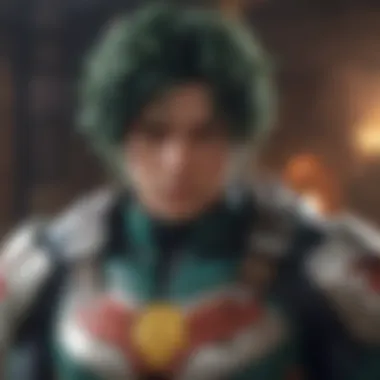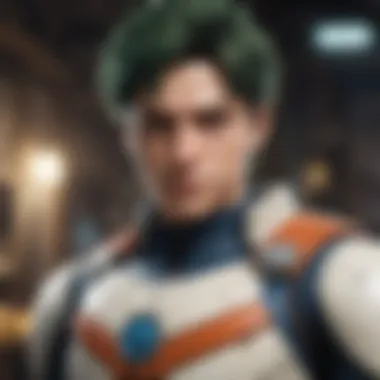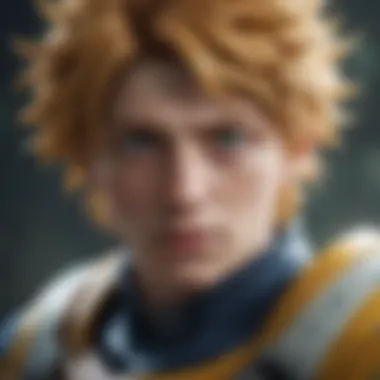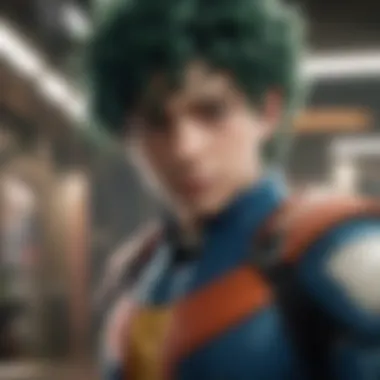The Strongest Hero: Analyzing My Hero Academia's Essence


Intro
My Hero Academia offers a rich tapestry of themes woven through its characters and their journeys as heroes. This world is centered on heroism, a concept which is heavily analyzed throughout the series. The phrase strongest hero often comes to mind when discussing this universe, but what does it truly mean? To address this, we need to explore its various facets, encompassing the motivations behind heroism, the responsibilities that come with power, and the ethical dilemmas faced by characters.
In each facet of heroism, key figures arise, displaying unique characteristics shaped by their experiences and challenges. This discussion serves to unpack the complexities of these characters, reinforcing the notion that true strength extends beyond mere physical capabilities or spectacular abilities. Every hero in My Hero Academia holds value, and their growth often reveals profound truths about loyalty, justice, and sacrifice.
Through this exploration, we intent to answer crucial questions: Who truly embodies the ideals of the strongest hero? What can audiences learn from their growth? And how does it relate to contemporary views on heroism in a real-world context?
The article is structured to provide a cohesive narrative surrounding these nuances, notably focusing on how the progression and dynamics among characters complicate our understanding of heroism itself. Let's begin this inquiry by looking more closely into the overarching themes present throughout My Hero Academia.
Prelims to My Hero Academia
My Hero Academia offers a fascinationg exploration into the nature of heroism. Set in a world where almost everyone possesses superpowers, or Quirks, this series captures the attention of audiences globally. Understanding it is crucial as we navigate the complexities of its characters and narratives. The series examines key deffinitions of strength and morality.
Overview of the Series
My Hero Academia, created by Kohei Horikoshi, debuted in 2014. The story follows Izuku Midoriya, a Quirkless boy who aspires to become the greatest hero. Society regards heroes as paragons of justice. They prohibit villains, who misuse their powers. As the plot progresses, readers witness a detailed development of characters and their relationships with each other. This character progression is significant because it reflects modern societal values.
The combination of lightheartedness and serious themes allows audiences to connect emotionally with the series. As a medium for discussing moral dilemmas, it enhances the depth of storytelling that gives the series lasting power.
Setting and Context
The setting of My Hero Academia is a modern Japan where about 80% of people have superpowers. This landscape dissects traditional notions of heroism, establishment, and power. Heroes, often funded by corporate sponsorship, aim to balance the pursuit of justice with the impact they have on public perception.
On the other hand, the emergence of villains disrupts order and exacerbates societal conflict. This falling tension illustrates the struggle underlying the pursuit of heroism. Interaction between heroes and villains embodies the moral questions raised throughout the series. This intertwining fabric compels readers to think critically about the energy of power, corruption, and ethical responsibility.
Invoking a sense of realism, even in the most extravagant scenes, anchors the audience. It emphasizes how heroism aligns or contrasts with the one’s true nature. The world of My Hero Academia, therefore, is not just a backdrop; it is a key player shaping the narratives of all catalysts within.
The profound interplay between strengths and weaknesses of heroism emerges in every aspect of the narrative, warranting careful exploration.
Defining the Strongest Hero
To understand the concept of the strongest hero within the context of My Hero Academia, it is vital to dissect what heroism truly entails. While typical hero narratives often emphasize raw power, this series invites a more nuanced debate about what makes a hero. Heroism requires examining intrinsic qualities alongside physical capabilities, creating a layered understanding that applies to the real world and fictional realms alike.
Thus, defining the strongest hero transcends mere valor or situational strength. This definition must include components such as bravery, wisdom, empathy, and the capacity for sacrifice.
Attributes of a Hero
To fully grasp the essence of a hero, one must consider several core attributes. Each attribute intertwines to form a cohesive image of an idealized hero, specifically within the narrative landscape of My Hero Academia.
- Courage: Heroes face formidable challenges while putting themselves in danger for the sake of others. This trait underscores their willingness to act in situations that most would find daunting.
- Integrity: Upholding ethical principles is critical. Integrity involves maintaining honesty and transparency, traits evident in characters like Izuku Midoriya, who strives to do what is right even against conflicting pressures.
- Empathy: The strongest heroes influence others positively and understand their emotions and contexts. Characters such as All Might display deep emotional intelligence supporting those around them.
- Growth: Continuous self-improvement sets true heroes apart. They evolve aboard challenges, adapting both personally and in skills. Shoto Todoroki's arc exemplifies this journey.
Examining these attributes provides insight into how characters behave, make decisions, and affect those in their lives, thus creating a platform for nuanced discourse on heroism.
Philosophical Underpinnings


Delving deeper into heroism explores its roots in philosophy. The series raises several key questions around power and morality that impact the perception of its heroes.
- Does power justify ethical decisions? In the clash between heroes and villains, decisions often hinge on capable utilization of power. All Might’s journey compels viewers to ponder if brute strength mandates moral clarity.
- Can one be a true hero without sacrifice? Many characters showcase profound sacrifices. Their struggles help illuminate the understanding that being a hero involves personal loss to uplift others’ lives. This contribution reverberates through the arcs of lesser heroes, emphasizing sacrifice as a fundamental component.
- Must heroism be selfless? Heroes face dilemmas questioning the underpinning motivations behind their actions. Characters such as Katsuki Bakugo embody a complex study of ambition versus altruism, challenging established norms of selflessness.
Main Characters and Their Strengths
The exploration of main characters within My Hero Academia is pivotal to understanding the appeal and depth of the series. Each character embodies distinct strengths that, while varied, contribute to the broader themes of heroism and personal growth. Analyzing these characters unveils the complexity of their paths, revealing the intricate relationship between their powers, ethics, and humanity. This section provides an in-depth look at influential characters, including Izuku Midoriya, All Might, Shoto Todoroki, and Katsuki Bakugo. Each narrative is not only thrilling but an exploration of the human condition under varied pressures and expectations.
Izuku Midoriya
Izuku Midoriya serves as a primary lens through which the series examines heroism. Initially introduced as quirkless, Midoriya symbolizes potential and perseverance, emerging into a unique hero through sheer determination. With the inheritance of All Might's quirk, One For All, his evolution centers on transformation, as he grapples with overcoming challenges.
He faces multiple obstacles that test both his physical abilities and moral decisions. Midoriya's focus on growth and self-improvement contrasts with inherent hero traits, highlighting that strength is not just due to power but also resilience and intellect. His mistakes and learning moments resonate, thus making him relatable to an audience wishing to understand themselves in a complex world.
All Might
All Might is widely regarded as the paragon of heroism within the series. His iconic status and overwhelming power instill hope among people, while his massive physique affirms his role as a symbol of strength. However, All Might's character is far more nuanced
His principle of “smiling” even in adversity forms the foundation of his impact. Beneath the muscular exterior lies vulnerability from injuries sustained during battles, revealing the burden heroes carry. The depiction of these complexities represents a layered understanding of what it means to be a hero, underscoring that past glory does not negate future uncertainty.
Heroes are not just powerful. They live among us—flawed, human, and real.
Shoto Todoroki
Shoto Todoroki encapsulates the struggle between conflicting legacies. He possesses the formidable abilities of both ice and fire, yet he continuously tries to come to terms with them as reflections of his family legacy. This internal confrontation mirrors the struggle many face with familial expectations and personal desires.
Through his character arc, Todoroki explores what it really means to be strong. Rather than simply wielding his powers for prowess, he learns to align them with his values. His growth focuses not on embracing an overriding identity connected to a single power but on balancing both extremes within him, signifying the multi-faceted dimensions of human capability.
Katsuki Bakugo
Katsuki Bakugo, with his explosive personality and abilities, embodies a raw form of ambition and rivalry. His brash attitude initially defines him, diverging sharply from the archetype of a traditional hero. However, Bakugo’s character development provides depth. Challenging Midoriya serves as a dynamic force motivating both of them to grow.
Bakugo’s journey consists of grappling with his understandings of strength, pride, and humility. His path from villain to ally reflects maturation, emphasizing that true strength is often accompanied by understanding one’s own flaws and the value of teamwork. The complexities of his character reflect gripping nuances often absent in typical representations of heroism.
In sum, the analysis of these characters in My Hero Academia not only highlights their individual strengths but elucidates an understanding of heroism as a multi-dimensional construct. The strengths and struggles of Izuku Midoriya, All Might, Shoto Todoroki, and Katsuki Bakugo provide insightful commentary on the human experience within extraordinary circumstances.
The Role of Villains in Defining Heroes
In My Hero Academia, villains play a crucial role not just as mere obstacles for heroes but as integral parts of the narrative that shape the concept of heroism itself. They provide a foil to heroes, offering contrasting traits, goals, and morals that help to illustrate what it means to be a true hero. The interaction between heroes and villains exposes weaknesses, strengths, and philosophical dilemmas that exist at the core of heroism. This section evaluates the importance and implications of these antagonists in colorizing the path of heroes in the series.
Character Analysis of Major Antagonists
The villains in My Hero Academia are not one-dimensional entities; they exhibit a breadth of motives and complexities. Characters like All For One, Tomura Shigaraki, and Overhaul do more than incite fear; they provide depth to the story by highlighting significant questions about power and ideology. All For One, for example, embodies the consequences of using power for selfish reasons. He leverages his Quirks to dominate, presenting a dramatic contrast to the selflessness heroes aspire to.
Tomura Shigaraki holds a different set of motivations. His desire for destruction emanates from a past rife with trauma. Understanding his background compels viewers to confront the notion that villains are often shaped by their experiences. Shigaraki challenges heroes not only physically but also morally—for every villainous act he commits, the heroes must grapple with whether they are equipped to change or understand these adversaries. This brings an essential dynamic into play: heroes can’t ignore the social context that fuels villainy.


Moreover, characters like Overhaul highlight themes of corruption and moral depravity. His utilitarian approach—where sacrificing individuals for a perceived greater good becomes acceptable—forces heroes to navigate ethical boundaries. The traits of these antagonists serve as a catalyst in hero growth. Navigating villain confrontations not only boosts heroes’ skills but also accentuates their ideological commitment.
The Contrast with Heroes
The dialectic between heroes and villains in this series sharply underscores the complexities of both roles. With protagonists like Izuku Midoriya and All Might standing on the side of justice, viewers appreciate their principles through the contrasting behaviors of villains who pursue personal ambition, vengeance, or chaos. This contrast serves several functions:
- Moral Exposure: Villains challenge the heroes’ principles. They force them to rethink their skills, their qualities, and ultimately, their mission.
- Relevance of Ideals: Each clash with an antagonist pushes heroes towards clarifying their responsibilities. The question of what it means to wield power arises.
- Evolution of Characters: Through antagonists, primary heroes evolve. The engagement provokes introspection, leading to growth approximately relevant to the audience.
“Villains offer necessary tension and provoke introspection in heroes, presenting moral conundrums that pave the way for deeper character development.”
Themes of Power and Responsibility
In any narrative, themes often serve as the backbone, revealing deeper meanings and ethical quandaries. In My Hero Academia, the themes of power and responsibility become paramount when exploring what defines a hero. The abilities possessed by characters are significant, but even more important are how they wield those powers. This intricate relationship shapes not only individual arcs but the broader moral landscape of the series.
Balancing Strength and Morality
The characters in My Hero Academia faced constant decisions regarding the use, or misuse, of their strengths. It becomes crucial for them to navigate the delicate balance between achieving personal goals and adhering to broader ethical standards. For instance, Izuku Midoriya exemplifies this struggle where he often arrives at confrontations ready to save, not to destroy. This intentional distinction—choosing to do good despite the temptation to abuse power—and plays deeply into the core of heroism.
Flawlessly mastering quirks and exhibiting heated confrontations are mere surface details. The inner conflict, however, can resonate profoundly. Prospective heroes do not merely clash with external foes, but also against their selfish impulses, which mar reflections of true heroism.
- The realities of hero work frequently lead them into morally ambiguous situations.
- Characters such as Bakugo showcase this juxtaposition, balancing aggressiveness with determination to protect and uplift.
- Morality not only defines heroes but also demarcates true power from mere strength. Those who recognize the weight of their actions typically emerge as greater heroes.
Consequences of Power
Dependencies on power carry various burdens that evolve with circumstances. The narratives surrounding My Hero Academia provide instances where unchecked power becomes destructive. Villains like All For One accentuate those ideas, pushing the protagonists to comprehend the vital principle that power devoid of principles comes with overt repercussions.
The consequences are sometimes immediate, yet often gradual, echoing throughout life decisions and societal structures. In that sense, the repercussions suffered by society also rebound onto the flawed heroes who neglect this balance.
“The true measure of a hero lies not in their strength but in their ability to choose wisely in the face of temptation.”
Visibility of ramifications reshapes character dynamics. For example, when Ujiko exploits his quirks unlocking catastrophic potential, Midoriya's realization encapsulates the dangers inherent in the loss of liberty concerning choices; power alone cannot define a hero. Within the dialogue on power throughout the series, summation on consequences paints discrepancies along the lines of moral clarity. Responsibility directly intersects here—demonstrating both the burden acquired and ultimately the growth that manifests in such intricate narratives.
Characters achieve development not just by mastering their quirks, but in recognizing their responsibilities towards others, differentiating giving life or taking it. At the heart of it, true growth inherits acknowledgment: the enhanced character consciousness respecting the weight of abilities. The newest generation must negotiate these themes amid shifting landscapes of conflict, broadening My Hero Academia’s underlying implications vastly. The series' treatment of power—still fraught—anchored in responsibility ignites substantial dialogues not only enclosed in the medium but reflects themes of broader society.
Impact of My Hero Academia on Pop Culture
My Hero Academia has undeniably reshaped the landscape of modern anime and fandom. The series stands out, highlighting various themes such as heroism, morality, and personal growth. Its impact goes beyond just entertainment; it shifts perceptions on what it means to be a hero. This article section will delve into the essential role My Hero Academia plays in shaping modern cultural hero archetypes and fostering community engagement among dedicated fans.
Influence on Modern Hero Archetypes
The archetype of the hero in contemporary media has often been marked by a simplistic duality: good versus evil. My Hero Academia challenges this dynamic. Unlike the traditional hero narratives, the characters in My Hero Academia exist in a nuanced world where motivations and backstories intricately blend.
Key aspects that mark this evolution include:
- Complex Characters: The protagonists and antagonists have multifaceted personalities. Characters like All Might and Deku demonstrate that strength does not solely rely on physical prowess. Their development hinges on kindness, resilience, and fierce responsibility.
- Flawed Heroes: Each character carries their imperfections. This realism is refreshing compared to typical depictions of flawless heroes. It allows audiences to relate on a human level.
- Expanding Definitions of Power: My Hero Academia explores different types of power—imbuing traditional notions of strength with emotional intelligence and integrity. Heroes must be prepared not just for battle, but also to navigate the moral quandaries that their power presents.


This deeper examination signifies a transformative approach, prompting audiences to reconsider their perceptions of heroism in modern narratives.
The notion of heroism prevalent in the series has started influencing various other mediums and genres. Writers of graphic novels, video games, and films increasingly adopt traits from characters like Shoto Todoroki and Eraser Head as benchmarks for new complex hero portrayals.
Fan Reception and Community Engagement
The fanbase for My Hero Academia expands rapidly, marked by various means of community engagement. The connection fans feel with the series extends from the unique characterization to the broader narratives that resonate with the societal themes of today's world.
Cohesive fan engagement is evident through various channels:
- Online Communities: Platforms such as Reddit and Facebook host active discussions about episode analyses, character arcs, and thematic elements. Fans share insights and perspectives, upgrading communal understanding and often reshaping interpretations of the story.
- Creative Expressions: Fans actively consume and reproduce what the series presents. Fan artworks, fan fiction, and cosplays emerge as forms of homage and personal expression, allowing for rich creativity rooted in the every day nuances of My Hero Academia.
- Fan Events: Conventions and meet-ups facilitate deeper connections among fans. These gatherings celebrate the series while also rendering space for debates and discussions about its cultural significance.
In summary, the interaction this series fosters amplifies its cultural resonance, evolving a shared narrative where personal interpretations become integral to understanding heroism in its entirety.
By examining these facets, we see that My Hero Academia does not merely function as an anime; it contributes significantly to the ongoing discourse about heroism, identity, and communal ties, ensuring its legacy remains etched within contemporary culture.
Future Directions in My Hero Academia
As My Hero Academia continues to develop, the future direction of the series emerges as a vital area of focus. This discussion extends beyond mere speculation about plot lines; it grapples with the essence of heroism itself. Analyzing future arcs can uncover underlying themes and set the tone for character evolution. Especially in a world as complex as this, new potential can either solidify or challenge our understanding of what a hero means.
Character Development Prospects
Character development remains a cornerstone in My Hero Academia. As the narrative unfolds, established characters are confronted with challenges that force growth or reveal vulnerabilities. For example, Izuku Midoriya's journey is marked by transformations, where he must not only harness his power but also grapple with his self-image as a hero.
New characters, introduced with varying backgrounds, can bring fresh perspectives. These new dimensions help to highlight existing heroes' growth or stand in stark contrast to their journeys. Every new interaction opens doors for deeper exploration into personal and collective identity within the hero community.
Development will probably intertwine with unresolved issues, especially with former heroes impacting the younger generation. Questions of legacy, morality, and personal struggles emerge. These threads conclude to strengthen connections between heroes and their ideals. Ultimately, the stakes continue to rise, promising richer narratives for characters we already know and characters unfamiliar.
Evolving Themes and Concepts
As the saga progresses, themes and concepts also evolve. Initially centered around straightforward heroism, the narrative now dives into more nuanced interpretations of strength, responsibility, and the impact of societal expectations. The definition of a hero experiences continual refinement, particularly in the face of personal conflicts.
As the anime explores these evolving themes, societal dynamics mirror real world problems. Concepts of power equality grad rather heavily call into question the frameworks defining heroism. It raises questions about the moral implications of power imbalance within the core community of heroes and villains.
A crucial aspect is scrutinizing what responsibilities come with great power. Current conclusions about evil and good evolve. Heroes are increasingly scrutinized for their choices, driving home the message that no character is fallible. This develops into a more dynamic dialogue about what a successful hero looks like.
Finale
In wrapping up this exploration of My Hero Academia, we gain a clearer insight into what defines heroism, particularly regarding the notion of the strongest hero. The series offers a nuanced view of strength, intertwining physical prowess with moral and ethical considerations. This layered approach compels audiences to reconsider typical assumptions surrounding heroics.
Summation of Key Points
My Hero Academia showcases a range of characters who embody different forms of strength. Each character’s journey offers distinct lessons:
- Izuku Midoriya demonstrates that determination and heart can substitute for innate ability.
- All Might personifies the ideals of selflessness and sacrifice, setting a benchmark for heroics.
- Shoto Todoroki illustrates the struggle between heritage and personal beliefs, adding depth to the discourse on power.
- Katsuki Bakugo challenges traditional notions, presenting tenacity as a legitimate path to greatness.
The roles that heroes and villains play are equally critical. Villains serve to highlight the unique struggles heroes face, illustrating that one’s context is key to defining strength.
Final Thoughts on Heroism
Ultimately, heroism within my Hero Academia transcends physical strength it reflects deeper moral dilemmas faced in everyday life. The series encourages a reflective lens toward expectations of heroes, extending a narrative that resonates with its audience. Here, power is not an ends but a means; a responsibility that must be borne with care and consciousness. For today's viewer, the strongest hero illustrates that although traits like muscle power are admirable, what may be as potent—and perhaps even more essential—are the existential choices a hero makes. Through their journeys, they provoke conscientious contemplation on the nature of both heroism and humanity.
As audiences look ahead at the continued development of My Hero Academia, the rich complexities of heroism remind us all of heroism’s dual nature: an impressive display of might that always beckons a question of morality.



